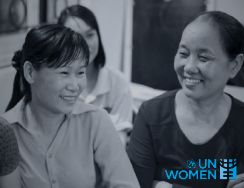Viet Nam
| Date of Accession/ Ratification: | 29 July 1980 (signed), 17 February 1982 (ratified) |
| Reservations: | Article 29 (1) |
| Optional Protocol: | Not signed |
| Reporting Status: | - Initial report examined at 5th Session, March 1986 - 2nd report and combined 3rd and 4th reports, examined at 25th Session, July 2001 - Combined 5th and 6th reports examined at 37th Session, Jan 2007 - Combined 7th and 8th reports to be examined at 61st session in 2015 |
| Shadow reports | Shadow report for 2006 and 2010 (not official) |
| Concluding Observations | Concluding observations of 37th session; 5th and 25th session |
| Follow-up reports | Follow-up state report for initial session |
| General Recommendations | General recommendation No. 1 (fifth session): Initial reports submitted should cover the situation and thereafter be submitted at least every four years. To include obstacles encountered in implementation and measures adopted to overcome this. |
| Coordinating Agency for CEDAW implementation: | Ministry of Labour, Invalids and Social Affairs (MOLISA) Committee for the Advancement of Women in Justice Sector (CWAJS) Ministry of Justice (MOJ) Viet Nam National Assembly’s Parliamentary Committee for Social Affairs (PCSA) Institute of Sociology (under Ho Chi Minh Political Academy) |
Viet Nam (officially the Socialist Republic of Viet Nam) is the easternmost country in Southeast Asia’s Indochina Peninsula, bordered by China, Laos and Cambodia. A one-party communist state, Viet Nam emerged from almost three decades of war to become a unified country in 1976. Despite being severely hit by the Asian financial crisis in the late 1990s, Viet Nam has become one of the fastest growing economies in Southeast Asia today. However, it is ranked 127 out of 187 countries and territories on the Human Development Index, and falls below the medium human development average, as well as the average for East Asia and Pacific countries.
However, there is a growing disparity in wealth between urban and rural, and between the middle and lower classes, is visibly noticeable in Viet Nam. Deep pockets of poverty remain in the country, most notably among the 53 ethnic minority communities living mostly in the highlands, which constitute two-thirds of Vietnamese territory. The situation is disproportionately affecting women, forcing them to take on vulnerable jobs that are lower paying, often with no formal labour contract and typically lack access to labour protection. Girls living in rural and remote areas, and ethnic minority groups, also have limited access to education, and while high literacy rates exist for the country, there are still a high proportion of girls dropping out of school. There is also limited access to adequate health services and employment opportunities for them.
| Adopted legislation | Ratified international human rights treaties |
|
|
Figure 1 Legislative measures and international human rights which have been
signed in the last decade
Concerns of societal stereotyping of women’s role within the family are prevalent in Viet Nam, particularly with the preference of a male offspring. Their role in the public sphere is heavily influenced by patriarchal values which inherently contribute to the persistence of violence against women. The 2010 National Study on Domestic Violence revealed that 58.3% of ever married women experienced at least one type of domestic violence at some point in their life, and 34% experienced physical or sexual violence. Viet Nam has adopted the Law on Domestic Violence Prevention and Control in 2007, yet the perception of domestic violence as a private family issue still prevails in the society, resulting in low reporting rates. Even when a case gets reported, the conviction rates are extremely low. The gap between law and its implementation remains challenging in other areas as well. Women are consequently disadvantaged in their access to equitable employment opportunities, equal enjoyment of land use and political participation in decision-making bodies at district and commune levels.
| Multidimensional Poverty Index Rank – MPI – (of 104 countries) – ‘head count’ (%) | From 2010/2011 survey: 4.2 |
| Gender Inequality Index Rank – GII – (of 148 countries) | In 2012: 48 |
| Social Institutions and Gender Index – SIGI | In 2009: 31 (of 102 countries) In 2012: 43 (of 86 countries) |
Discrimination also remains in some areas of law. The revised Labour Code of 2013, for example, further guarantees equality and non-discrimination in labour, however the unequal retirement age remains unchanged. On another hand, not all national legislations are meeting international norms and definitions. While Viet Nam is implementing measures to prevent prostitution and trafficking of women, there continues to be low rates of prosecution and conviction of traffickers who sexually exploit women. This is partly because the definition for trafficking under the current law is unable to capture illegal activities of the traffickers. Women and girls who have survived trafficking and returned to their communities also face stigmatisation as victims of prostitution who are then denied due process rights.
The rise in imbalanced sex ratio at birth, high abortion rates particularly among adolescent and young women, and the increase of population affected by HIV/AIDs are also areas of concern for women and girls especially in relation to violence against women. More information at CEDAW in Action - Viet-Nam.
Supported by:Latest news
At a glance

Getting to know more about CEDAW and the Regional Programme in Southeast Asia | CEDAW Brochure